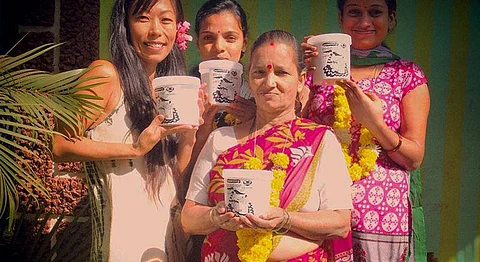
- #HGCREATORS
- #HGEXPLORE
- #HGVOICES
- #HGSHOP
- CAREERS
- ABOUT US
- CONTACT US

Do you wash your own clothes?
Let me be a little clearer - do YOU wash your own clothes, as opposed to a machine or perhaps another person? I’m asking only to provide a little context - not to blame you for something you haven’t done.
It wasn’t until I was hunched over a pile of clothes, fingers wrinkly from soap water and eyes more than a little itchy, wringing the coloured, chemical water out of my clothes that I had the thought - whatever this mix of red and blue liquid is that’s coming out, it doesn’t look too good. How am I justifying the “cleaning” of my clothes by aiding in the destruction of my planet? Was there a justification at all?
If you’ve taken the time to read through the label of any cleaning products, you’re sure to find names of chemicals you can’t even pronounce in one go. These chemicals have come to have a significant effect on the world we live in - phosphates often in laundry detergents and dishwashing liquid cause algal blooms in water bodies, consuming all the oxygen in the water and destroying biodiversity of that area. Some products, especially your personal cleansing products, are known to have micro plastics in them. These beads of sorts end up in entwined within the food chain, and have most recently been found in Whale Sharks, the largest fish in the sea who only ever eats plankton.
In all the different iterations of paradise that my mind had created, never once had I imagined what kind of cleaning products I would have with me - products worthy of being there. It’s easy to forget that one can still get dirty in paradise. All that changed the minute I came across Resora - a laundry detergent made by hand from used edible oil in Goa.
I was almost in disbelief, so I bought a packet, tried it, and immediately wrote to the girl making it - Marie Saito. I spoke to Marie about her process, the benefits of her product and the implications of making small but significant changes that can drastically alter the state of our planet.
The core ingredient of this product is the leftover edible oil and the first step is to collect it. This is done by speaking to a few restaurants beforehand who typically have leftover oil, and getting them to keep it aside for pickup. Then, they use a soap-making process called hot process. “First of all, we mix the used vegetable oil and caustic soda. Then we move on to the salting-out process which removes impurities and excessive alkaline elements by adding hot water and salt. After doing the salting-out processes three times, we mix the solution and washing powder and dry it for a week under the sun. Finally, we put the soap in a mixer to make it into powder” Marie explains.
The product, an exemplary display of upcycling, is completely rid of any toxins, fragrances, or chemicals that would adversely affect the oceans where the oil would otherwise drain into if not for this process. The soap is completely biodegradable and the water left over from the washing can be used in your garden without a qualm. The soap can be used to wash clothes as well as as a cleaning product for floors. It can be used in a laundry machine as well, but put the soap in directly into the machine rather than in the slot for the soap.
The largest argument supporting the use of this product is to simply cut out the toxicity of the products that are currently being used by the masses. The toxic chemicals do not simply disappear, and it’s about time we came to terms with this fact. A small step by an individual, a family, a building, a community, a neighbourhood eventually goes a long, long way.
This process is naturally one that takes a significant amount of time and effort. At the beginning of this year, Marie executed everything on her own - from beginning to end. This was her learning process, as she describes it. Later, she used Work Away and created a volunteer program for people traveling through. They would get stay in exchange for their help with the soap making process. While this proved to be useful, it is hard to have a sustained amount of help throughout the year, and this still remains to be a large challenge for Marie.
Marie lives in Goa, where she makes her soap. It is for sale at Oxford Supermarket, Orchard Supermarket, People Tree and Larry’s Hut. Each packet of soap costs Rs. 300. You can write to Marie at resora.soap@gmail.com and reach out via Facebook if you are interested in having a large shipment sent to you, or if you’d like to work away and learn how to do this yourself!
If you enjoyed this article we suggest you read:
